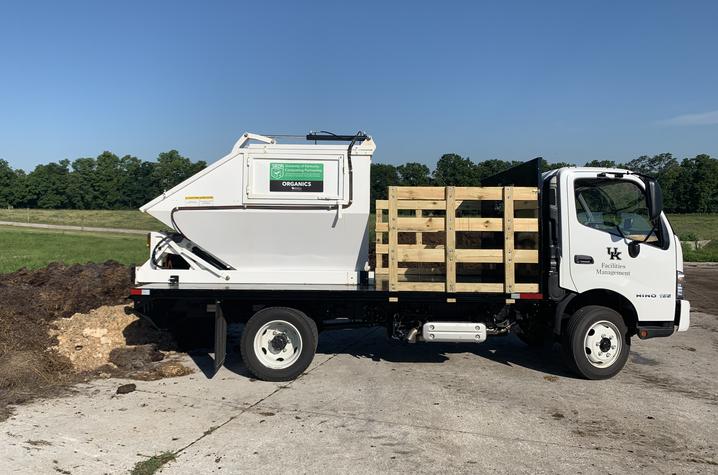The University of Kentucky took another important step toward its sustainability goals with the launch of a food waste composting program earlier this week. The effort will reduce the amount of material going into the landfill and produce an organic, nutrient-rich soil amendment for use on campus farms and landscaping. The program, which launched Monday, will be piloted at Champions Kitchen through the summer and expanded to include Fresh Food Company at the start of the fall semester. Other dining locations may be added at later dates. This new initiative is a partnership between UK Dining, UK Recycling, and the College of Agriculture, Food and Environment (CAFE) that grew out of several years of planning and preparation.
“Our students have done a remarkable job of leading food recovery efforts to address hunger and food insecurity through programs like Campus Kitchens, Farm-to-Fork, and the Big Blue Pantry. The composting program complements this work and boosts our ability to keep food waste out of the landfill through a closed loop system that turns a waste material from one process into a beneficial material for another.”
Carolyn Gahn, former Sustainability Director for UK Dining
UK worked with Aramark (UK Dining) on the design of both the Fresh Food Company and Champions Kitchen to minimize waste and reduce barriers to composting. Both facilities use washable cups, plates and silverware. Pump stations and bulk containers are used for most condiments, sauces, dressing, etc. to avoid the plastic waste created by individual packets. Both facilities are also tray-less, which helps prevent food waste by limiting the amount of food that can be carried to the table in one trip. There are no straws or lids for the cups and no disposable to go containers, though reusable ones are available for purchase. The cumulative effect of these design decisions makes collecting food waste from the dining areas simple because there are very few non-compostable items available. Those that remain (ice cream containers, waffle mix cups, etc.) are pulled by UK Dining staff once the plates reach the dish room. Food prep waste from the kitchens will also be included in the program.
The food waste and napkins are “pulped” in the dish rooms to shred and remove excess liquids. The pulped material is collected in carts that are picked up by UK Recycling. UK Recycling purchased a truck outfitted with an enclosed, self-dumping container and cart tipper to divert this new waste stream using funding secured from internal and external grants.

The final step is the actual composting which will take place at CAFE’s C. Oran Little Research Center in Woodford County. The food waste will be combined with a carbon source (wood chips, grass clipping or animal bedding) in a windrow system to speed the conversion to a nutrient-rich compost. The finished compost will be used at the university’s Organic Research Farm and by UK Grounds to provide an organic fertility boost to crops and campus landscaping.
“The food waste composting partnership has been in the works for several years, and with the university’s increased focus on sustainability, it just makes sense to try composting as a pilot project,” said Steve Higgins, the director of Animal and Environmental Compliance for the UK College of Agriculture, Food and Environment. “We are able to leverage existing facilities and equipment and our composting expertise to divert valuable, nutrient rich food waste from the landfill and return it to the land as a soil amendment. This initial project will allow us to gather data to plan for the future of the university’s food waste composting program.”

Asses your food waste impact by performing a waste audit! Check out UK Recycling’s Waste Audit Worksheet to get started!


























